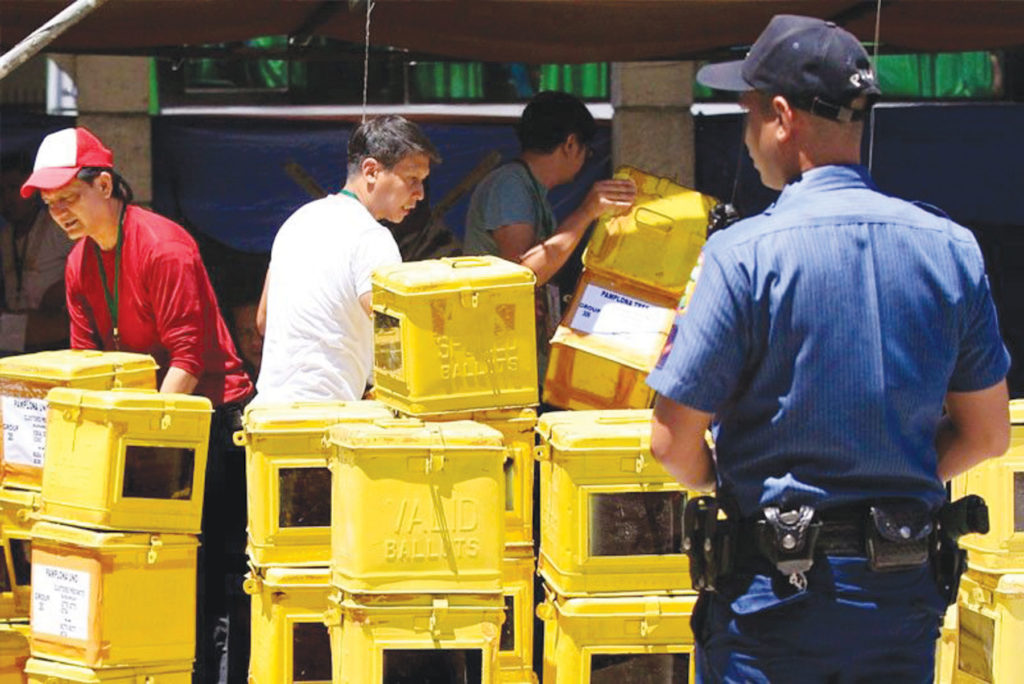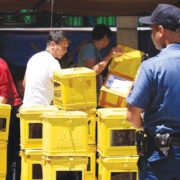
THE Commission on Elections (Comelec) on Tuesday, May 7, began its final testing and sealing (FTS) of the 85,000 vote counting machines (VCMs). This will determine if the VCMs can count the votes accurately as well as if the results will be transmitted to the canvassing centers from the polling precincts.
“We are ready,” said James Jimenez, spokesman for the Comelec. “The delivery of election materials is almost 100 percent complete.”
Members of the media were toured by the Comelec around the PICC-The Forum facility, where the national canvassing of ballots will be held.
The Comelec expects to announce the winners in the local elections within 24 to 36 hours after voting closes at the polling precincts. For the proclamation of the Magic 12 in the senatorial race, meanwhile, the target is within two weeks after the elections.
Both the Comelec and Philippine National Police (PNP) are hopeful that the midterm polls will have peace and order.
According to Jimenez, fewer areas are considered poll hotspots. Less than 550 areas fall under Category Red, which is the highest stage among the hotspots, due to the presence of armed groups and history of election-related violence.
“I think this is important because at the start of the year or even before the election period, many people have been killed. But in recent days, election-related violence decreased,” he noted.
PNP spokesman Col. Bernard Banac said they expect the peace and order situation in the run up to the polls would continue until Election Day.
During a forum at the Comelec, he said: “The PNP along with the Armed Forces of the Philippines is on full alert. So we are not taking any chances.”
“We assure the public that the PNP will remain apolitical and impartial as we are mandated to protect the will of the electorate toward honest, orderly and peaceful elections,” he added.
As stated by The Philippine Star, some 149,830 policemen and 98,000 soldiers will be working together to keep all polling places and other areas of concern safe before, during and even after election day on May 13.
PNP chief Gen. Oscar Albayalde, for his part, assured the whole PNP is on full alert status.
“We are already on full alert and as of this time, we have partial deployment in the different hubs,” he said after the send-off ceremony held in Camp Aguinaldo.
The ceremonial deployment was spearheaded by the Comelec, represented by Commissioners Luie Tito Guia and Al Parreño. It was participated by 809 personnel and 28 military vehicles, 778 personnel and 23 police vehicles, and representatives from other stakeholders like DepEd and the Department of Health (DOH).
“The send-off ceremony is a fitting testimony of our firm aspiration for a peaceful and successful conduct of the national and local elections next week. This also signifies that we are all prepared and ready to be deployed in the different areas where our services and assistance are very much needed,” said AFP chief Gen. Benjamin General Madrigal.
According to Albayalde, more than 36,000 polling centers nationwide will be guarded with at least two uniformed police officers especially in hotspots or critical areas in Mindanao where quick reaction teams will be on standby.
“For polling centers we’ll be probably deploying around 100,000 of our personnel, that includes the police assistance desks,” Albayalde said.
“As of this time, we see no threat whatsoever but of course we don’t want to put our guard down, and especially so in Mindanao,” he added.
Albayalde allowed policemen to use their cellphones for work-related matters such as sending updates on the status of the conduct of elections in their respective areas while they are on duty during election day.
Other measures launched
PNP also launched its National Election Monitoring Action Center (NEMAC) on Tuesday. This will allow real-time monitoring of polling centers nationwide.
Albayalde said about 60 police personnel will run the center, which will remain active a few days after the elections.
“This will give us real-time situation on what is happening on the ground, as well as the delivery of VCMs to different polling centers,” he said.
“If we want to know what’s the situation in polling centers, we will just click the specific polling center and then we will know who the person deployed in that center is,” he added.
The NEMAC will also inform police officers whether voting had started or ended at polling centers and if ballot boxes have been delivered to proper offices.
The Comelec, meanwhile, announced there are procedures in place should an earthquake happen, as well as whether a failure of elections should be declared in the affected area.
“The policy is being studied now on whether or not to declare a failure of elections. Of course, what is a strong earthquake? We have a lot of common sense (to know this),” Jimenez said during a press briefing.
“The safest bet here is to either suspend or declare failure of elections. That decision is still being made,” he added.
Jimenez also said the Comelec is prepared to secure the VCMs and other election paraphernalia during an earthquake.





